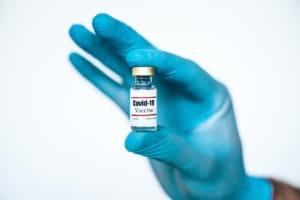
Updated Dec. 10, 2020 – The British regulator of medicines has set off alarm bells in the allergy community by warning U.K. medical personnel not to give the new Pfizer-BioNTech COVID-19 vaccine to anyone with “a history of anaphylaxis.”
The warning comes after two healthcare workers were reported to have experienced anaphylaxis-like reactions following an injection of the mRNA-based vaccine. Both people were known to have severe allergies, and carried epinephrine auto-injectors. Both are said to be recovering well.
But some U.S. allergists are seeking to calm fears about the safety of COVID-19 mRNA vaccines for people with a history of food or medication allergies.
“On the basis of these two reactions I would not tell anyone to avoid the vaccine,” University of Michigan allergist and immunologist Dr. James R. Baker told Allergic Living.
The Pfizer vaccine program had only begun to roll out in the U.K. on Tuesday Dec. 8, 2020. The warning followed the next day. Stephen Powis, Medical Director for the NHS, England’s national health service, said in a statement:
“As is common with new vaccines the MHRA [Medicines and Healthcare products Regulatory Agency] have advised on a precautionary basis that people with a significant history of allergic reactions do not receive this vaccination after two people with a history of significant allergic reactions responded adversely yesterday.”
The U.K. authority’s reference to “a significant history of allergic reactions,” was later updated to “a history of anaphylaxis.” June Raine, chief executive of MHRA, said: “Any person with a history of anaphylaxis to a vaccine, medicine or food should not receive the Pfizer-BioNTech vaccine. A second dose should not be given to anyone who has experienced anaphylaxis following administration of the first dose of this vaccine.”
The original full MHRA advice to hospitals adds: “Resuscitation facilities should be available at all times for all vaccinations. Vaccination should only be carried out in facilities where resuscitation measures are available.”
Confusion on Allergy Warning
While called “precautionary,” the U.K. advice is concerning and confusing for people worldwide who have a history of severe allergic reactions or anaphylaxis. The data on both the new mRNA vaccines from Pfizer-BioNTech and Moderna have shown convincing efficacy and safety data.
With the Pfizer vaccine, there was follow-up related to adverse effects among 38,000 study participants who received two shots of either the vaccine or its placebo. Those data show some side effects, such as injection site pain, fatigue, headache, muscle or joint pain, chills or vomiting. The data further show only a tiny number of suspected allergic reactions in both the mRNA vaccine and placebo groups (0.63% and 0.51%).
U.S. allergists are urging the allergy community not to be unduly concerned at this point, and to wait for the British authorities to investigate these adverse cases. [See also: Experts Seek to Calm Vaccine Allergy Concerns]
Little information has been shared about the two healthcare workers, including what their symptoms were, how soon after receiving the mRNA vaccine they happened, and whether the patients were treated for the reactions. True anaphylactic reactions happen quickly, and can show up in biomarkers in the blood, notes Baker. But this information, which could confirm whether the symptoms were indeed allergic reactions and not another sort of physical response, isn’t known.
Blanket Statement ‘Crazy’
Baker, director of the University of Michigan’s food allergy center, finds it was “irresponsible” for the U.K. regulatory agency to have issued a broad statement that could potentially influence the vaccine decisions of millions of people with food or drug allergies before a full investigation.
“I can’t imagine anybody would issue this blanket statement after one or two people had a reaction that wasn’t fully defined,” Baker said. “I could see caution, but suggesting that anybody who has a food allergy or who has had another allergic reaction is at risk is just crazy.”
Preservatives and animal products have been known to trigger reactions to other vaccines, but the Pfizer-BioNTech vaccine doesn’t contain any of those ingredients, he notes. “The contents of this vaccine do not include any protein component that could cause a true allergic reaction,” Baker wrote on his blog, where he included the vaccine ingredients. “Also, there were no serious allergic reactions reported in the 44,000 individuals in the clinical trial.”
That said, if the vaccine had been accidentally injected into a vein instead of the muscle, it could potentially disrupt the mast cells. Baker says that could lead to symptoms such as wheezing, hives or a drop in blood pressure. He says a vagal response, which can mimic an allergic reaction but is triggered by stress and even vaccinations, is another possibility.
As for the MHRA’s recommendation to have “resuscitation” measures in place, Baker hopes that any pharmacy or healthcare provider administering vaccines of any type will have epinephrine auto-injectors on hand in case of serious adverse reactions.
Were Circumstances Unique?
Dr. Mary Beth Fasano, president of the American Academy of Allergy, Asthma & Immunology (AAAAI), agrees that too little is known about the nature of the symptoms experienced by the U.K. healthcare workers to draw any conclusions.
“Over 40,000 individuals participated in the studies leading up to the approval in the U.K, and at least in that group, there was no uptick of severe allergic reactions,” says Fasano, a clinical professor of allergy and immunology at University of Iowa. “We just need to await more information on what happened in the U.K. There could have been some very unique circumstances for these two individuals.”
In the meantime, she and other allergists are concerned that the reports will have a chilling effect on people’s willingness to get this or any other COVID-19 vaccine.
“This could be detrimental to the critical need to enable physicians, patients and their family members to feel comfortable with receiving one of the COVID vaccines when they are approved,” she says, adding that the AAAAI is continuing to follow developments and will share information as it becomes available.
On Twitter, allergist Dr. David Stukus wrote of the MHRA allergy warning: “Need to pump the brakes, as crucial details are unknown. A recommendation for anyone with prior anaphylaxis for ANY reason to avoid is problematic. We don’t know what symptoms occurred in these 2 people, their history, or potential triggers. This will evolve.” Stukus, a specialist with Nationwide Children’s Hospital in Ohio, discussed the vaccine issue at length in an Instagram Live event on Dec. 10 with Allergic Living.
On Dec. 10, the U.S. Vaccines and Related Biological Products Advisory Committee Meeting voted to recommend that the FDA approve the Pfizer-BioNTech vaccine for emergency use authorization. A senior FDA representative said the agency had reviewed the mRNA vaccine’s safety data, and also conducted an independent review of the findings.
As well, on Dec. 9, Canada’s health regulator approved the Pfizer-BioNTech vaccine, and the first doses are expected to be administered very soon.
Related Resources:
Dec. 14, 2020: Experts Seek to Calm Vaccine Allergy Concerns
Instagram Q&A: Dr. Stukus re Allergy Questions on COVID-19 Vaccine
FDA Fact Sheets for Pfizer Coronavirus Vaccine, Including Ingredients





